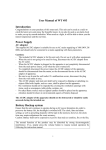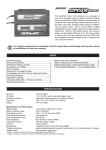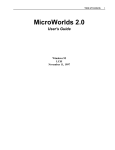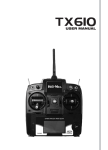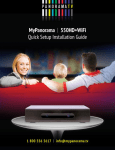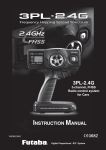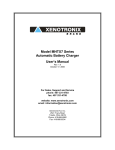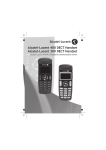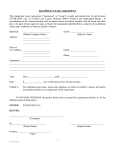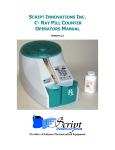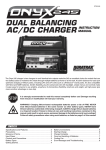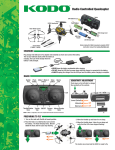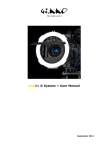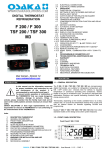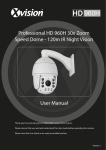Download Piranha Digital Peak Charger
Transcript
™ Congratulations on your purchase of the Piranha Digital Peak Charger by DuraTrax! Designed for peak detection charging of nickel-cadmium (NiCd) and nickelmetal hydride (NiMH) rechargeable batteries, the Piranha Digital Peak Charger offers programming flexibility normally found in expensive, upper-end computerized chargers - at an amazingly affordable price! It’s great for batteries containing from 1 to 8 cells, with fully adjustable fast charge current, peak detection sensitivity and trickle charge rates, and the addition of a custom 2-line LCD for displaying a wide variety of battery and charge data. The Piranha Digital Peak Charger is an unbeatable value in today’s market, and another great choice from DuraTrax, The Leader in Awesome R/C! Included with this instruction manual is a quick reference menu flowchart which shows how the entire program structure for the Piranha Digital Peak Charger is designed. Retain this flowchart for reference when reading this manual and for future use. SPECIAL FEATURES • AC/DC convenience is great for use at home or at the track! • Peak charges 1–8-cell NiCd or NiMH packs. • Peak charge current adjustable from 0.1 to 5.0 amps (3.0A maximum with AC input). • Automatic charge mode feature automatically charges batteries if specific charge settings are not pre-set. • Adjustable peak detection sensitivity or “threshold” from 3mV – 20mV, to custom match the charger to specific batteries. • Adjustable trickle charge rates 0, 100mA, 200mA. • Two-line, 8 character LCD for easy programming and data display. • Displays battery voltage, peak detection mV, charge time, current, and capacity. • Displays errors for improper input voltage, poor battery connections, and reverse polarity on the output. • Store pre-set charge parameters in memory for multiple batteries. • Multiple sound cues and melodies. • Microprocessor controlled intelligence and reliability. • Solid-state reverse polarity and short circuit protection on input and output. SPECIFICATIONS Input Voltage: Compatible Cell Types: 110V AC 60Hz, 11-15V DC nickel-cadmium (NiCd), nickel-metal hydride (NiMH) Cell Counts: 1-8 cells Peak Charge Rate: 0.1-5.0A, 3.0A maximum w/AC input Charge Rate Increments: 0.1A (100mA) Fast Charge Termination: zero delta peak Trickle Charge Rate: 0, 100mA, 200mA selectable Display Type: 2-line, 8 character LCD Sound Cues: individual tones and pre-set melodies Memory Pre-sets: store parameters for 10 battery packs Output Connectors: spring loaded terminals Case Size: 5 x 3.4 x 5.5" (127 x 86 x 140mm) Weight: 2.94 lb (1335g) IMPORTANT PRECAUTIONS • Do not charge battery types other than nickel-cadmium (NiCd) or nickel-metal hydride (NiMH) rechargeable batteries. Damage may occur from other types of batteries. • Do not connect AC and DC power sources to the charger simultaneously. • Do not attempt to charge batteries at excessive fast charge currents. • Do not use automotive type battery chargers to power the charger. • Do not leave the charger unattended while charging. Disconnect the battery and remove input power from charger immediately if the charger becomes hot. Allow the charger or battery to cool down before reconnecting. • Do not allow water, moisture or foreign objects into the charger. • Do not place the battery or charger on or near a flammable object while in use. Keep away from carpets, cluttered workbenches, etc. • Do not cover the air intake holes on the charger as this could cause the charger to overheat. • Always disconnect charger from power source when not in use. • Adult supervision required when used by a child. • Do not attempt to charge A, AA, AAA or smaller batteries above 1A rate. • Do not connect the battery to the supplied connector until it has been “locked’ into the charger. The Piranha Digital Peak Charger is capable of charging both nickel-cadmium (NiCd) and nickelmetal hydride (NiMH) battery chemistries, as identified by this symbol. Look exclusively for battery chargers with this symbol to handle both NiCd and NiMH charging needs. IMPORTANT CARE & HANDLING INSTRUCTIONS FOR NIMH BATTERIES While similar in appearance to sub-C NiCd batteries and having the same 1.2V rating per cell, NiMH cells contain a different chemical makeup which requires different care and handling. • Do not to allow NiMH batteries to overheat at any time. Heat can adversely affect the performance of NiMH batteries. If overheating is observed, disconnect the battery from the charger immediately and allow to cool! • Do not deep cycle NiMH batteries as permanent damage could result. • NiMH cells do not exhibit the “memory effect” like NiCd cells, so little cycling is needed. • Store NiMH packs with some voltage remaining on the cells. • Use a NiMH battery pack no more than three cycles per day, with a two to three hour break in-between for cooling. More frequent use is likely to overheat the pack. • NiMH cells have a self-discharge rate of approximately 2025% (compared to 15% for NiCd batteries). Thus, if NiMH batteries have been inactive for more than a few days it is important to recharge them immediately prior to use. CONFIGURING EACH MEMORY SETTING Follow these steps to configure a memory setting: 1. While the charger shows the default display, press the (+) button to access the “BATT SETUP” menu. 2. Briefly press ENTER. The “BAT. TYPE” setting will be displayed. Press the (+) or (-) buttons to set either “NiCd” or “NiMH” to match the exact chemistry of the battery to be charged. This tells the charger exactly how to identify peak charge for the battery to be charged. Press ENTER to confirm the setting. INPUT POWER 3. For “CAPACITY,” press (+) or (-) to set the charge input capacity to the desired mAh (milli-amp hour) level. This selection ranges from 50mA to 5000mA, in increments of 50mA. Press ENTER to confirm the chosen setting. The uses for this feature are as follows: To use a 12V DC battery or power supply for input power, attach the charger’s red alligator clip to the positive (+) terminal on the battery or power supply, and the black alligator clip to the negative (-) terminal. It’s best to use a “clean” DC power source whose output is filtered to remove unwanted electrical noise. To achieve the maximum potential with this charger, the source battery must be capable of delivering at least 6 amps of current while maintaining 12V DC. a. This can be used as a safety feature. If, for some reason, a battery never reaches peak, this feature tells the charger to terminate fast charge after this pre-set level of input capacity has been delivered to the battery. b. Many NiMH cell manufacturers recommend to leave a partial charge on a battery before putting it in storage for an indefinite period of time. Adjusting this capacity level setting before charging to a pre-determined percentage of the battery’s maximum rated capacity, will automatically supply partial charge to the battery. c. If this capacity setting is too low, the battery will not likely receive full charge. Conversely, if capacity setting is too high, it may not provide ample overcharge protection if the charger fails to recognize peak charge on the battery. d. To bypass the capacity feature, set the capacity level to maximum, or 5000mAh. Caution must be used in doing so as the charger must not be left unattended. e. If the battery’s rated capacity is not known or listed, consult your supplier to get the exact specifications for the battery. To use 110V AC for input power, connect the black AC plug to a regular 110V wall outlet. When input power is applied, the charger will automatically detect the input voltage level to determine if it is adequate for operation. The error message “Input V Error” will be displayed if the AC or DC input voltage is too high or too low. Double-check the power source at this time to determine what problem might exist. WARNING! Never connect the DC input leads to any power source simultaneously with AC input, as permanent damage to your charger may result! SELECTING A MEMORY SETTING The Piranha Digital Peak Charger contains 10 memory selections (numbered from 0 to 9), whereby different charge configurations for 10 different types of batteries can be stored. Once configurations are set into memory, this convenient feature makes it extremely easy to switch from charging one battery type to another without having to re-configure the charger each time. 4. The “CURRENT” setting determines how much current is to be delivered to the battery during peak charge. Press (+) or (-) to choose the desired charge current in amps. This selection ranges from 0.1 amp (100mA) to 5.0amps, in increments of 0.1A. Once the desired charge current is selected, press ENTER to confirm the setting. When power is applied to the charger, the LCD will show the LAST memory setting used. This will be referred to as the “default display.” The memory number will show between the arrows on the top line of the display, such as < 1 >. To help identify the proper memory selection all charge configurations will automatically scroll on the bottom line of the LCD while sorting through each memory selection. If the default memory selection is NOT appropriate for the next battery to be charged, select the appropriate memory to match the battery, as follows: If the 5.0A selection is exceeded, the display will advance to the “Auto” setting. Here, the charger will detect the internal resistance of the battery being charged every 1 minute and automatically adjust the charge current to properly match the battery. In addition, while in the “Auto” setting, if the battery type (selected earlier in the instructions) was set as “NiCd” the charger will automatically set the peak detection sensitivity level (see below) to 3mV. If the load battery selection is “NiMH,” the charger will automatically set the peak sensitivity level to 5mV. 1. Briefly push the middle ENTER button marked as “E”. The memory number on the top line of the LCD will begin to flash. Do not hold the enter button. This will cause the charger to begin charging. Note: When 110V AC input power is used, the maximum charge current will be approximately 3.0A even if the display setting for charge current is set above 3.0A. Full charge current can be delivered with proper DC input power. WARNING! Do not set the charge current too high for the battery to be charged! This could result in overheating of the battery, and lead to bodily harm or permanent damage to the battery and/or the charger. 2. Scroll up or down through the memory selections 0 - 9 by pressing (+) or (-). 3. Press ENTER once the proper memory selection has been located, which will be confirmed as the memory number will stop flashing. 5. The “∆ PEAK” or “delta peak” setting determines the charger’s sensitivity level for detecting peak charge of a battery. This is 2 do so could result in permanent damage to your battery and the charger. Match the positive battery lead to the charger’s red (+) terminal, and the negative (-) battery lead to the charger’s black terminal. Do not allow the charger’s positive (+) and negative (-) output terminals to be shorted while a battery is connected, as permanent damage to the battery will result. Make sure no stray strands of wire accidentally make contact with both the positive and negative terminals or battery connections. Make sure that the spring terminals have a “positive” lock by gently pulling on the connector. If the wires easily pull out of the spring connector, reinsert the wire. “Positive” lock is essential for accurate charging, thus helping to eliminate false peaks. sometimes referred to as a “threshold” setting. Press (+) or (-) to select the desired peak detection sensitivity. This selection ranges from a high sensitivity setting of 3mV/C (milli-volts per cell in the pack) to a low sensitivity setting of 20mV/C. A higher sensitivity setting (lower numerical value) instructs the charger to be more precise when detecting peak. This is often most accurate when charge current is set at a low rate. If charge current is set at a high rate, the charger could possibly terminate fast charge too soon as voltage fluctuations on the battery and power source are more dramatic at high charge rates. A low sensitivity setting (higher numerical value) instructs the charger to be less precise when detecting peak. This means the battery will likely be less full when fast charge is terminated, but the charger is less likely to prematurely terminate fast charge as a result of possible voltage fluctuations. A low sensitivity setting is usually unnecessary when a low charge current is selected, but could be more beneficial when a high charge current is selected. The connector should be hooked up to the charger before connecting the battery to the charger. PEAK CHARGING Once the desired peak sensitivity selected, press ENTER to confirm the setting. The display will return to the default display at this time. Choose the proper memory selection to match the battery to be charged. Review all charge parameters for the memory selection before proceeding (will scroll on the bottom line of the display). Re-select the proper memory selection if necessary. We recommend using a setting at 6mv/c for NiCd and 8mv/c for NiMH. 1. When the LCD shows the default display, press and hold ENTER for approximately 3 seconds to begin peak charge, which will be accompanied by an audible melody and the “Charge Start….” message on the display. TRICKLE CHARGE & AUDIBLE TONES The Piranha Digital Peak Charger includes the option to choose from three different trickle charge rates, and five different audible melody selections which will sound at various times during the operation of the charger. 2. Several conditions might exist which could prevent the charger from starting or completing the peak charge sequence. The LCD might display any one of the error messages shown below. After making the necessary error correction, return to step 1 in this section to re-start the peak charge process. 1. While the charger shows the default display, press the righthand (+) button twice to access the “USER SETUP” menu. a. “No Battery” will be displayed if the charger does not detect a battery connected to the outputs. Re-check for solid connections for each the black and red connection. b. “Wrong Polarity” will be displayed if the battery is connected backwards to the charger. Make sure the battery’s positive lead is connected to the red, positive (+) terminal on the charger, and the negative lead is connected to the black, negative (-) terminal on the charger. c. “Open Circuit” will be displayed anytime the battery becomes disconnected from the charger during peak charge mode. Re-check for solid connections for each of the black and red connections. 2. Press ENTER. The “TRICKLE” setting establishes the exact trickle charge current (in milli-amps) which will automatically be delivered to the battery immediately after peak charge has been terminated. Press (+) or (-) to select from 0mA, 100mA, or 200mA. Press ENTER to confirm the trickle charge rate selection. Selecting 0mA will deactivate the “trickle” charge mode. 3. The “MELODY” setting determines which melody will be played at various points during operation of the charger. On initial set-up, Melody1 will automatically play. At any time while Melody1 plays, press the (+) or (-) buttons to hear any of the other four pre-set melodies which will play automatically. The melody option can be disabled by selecting Melody Off. Press ENTER to confirm the melody selection and return to the USER SETUP menu. 4. Press the left-hand (-) button twice to return to the default display and begin the charge process. ACTIVE CHARGE DATA BATTERY CONNECTION Once peak charge has begun, the charger will automatically begin displaying data regarding the charge process on TWO different LCD screens. Press (+) or (-) anytime to alternate between the two screens, as follows: The output connections for this charger consist of two springloaded terminals. These terminals offer the optimum in convenience for using any charge connector of your choice. A pre-assembled standard battery connector is included with this charger. Securely connect the battery to be charged to the terminals with the positive (+) battery lead connected to the red, positive (+) terminal, and the negative (-) battery lead to the charger’s black, negative (-) terminal. SCREEN ONE: Fast charge amps 3.0 2300 12.000 V Charge input capacity in mAh Output voltage SCREEN TWO: Fast charge minutes (count up) WARNING! Always make sure to follow proper polarities when connecting the charge leads to the charger! Failure to 3 T 000:00 12.00 Vi Input voltage to charger FINAL CHARGE DATA After peak detection has been achieved the display will flash “Charge Complete” for 10 seconds accompanied by an audible melody, and the charger will automatically switch to trickle charge. The display will automatically change to show final charge data on two different screens, which will automatically alternate. Data will maintain on the display until another command is manually given to the charger. Data displayed will be as follows: SCREEN ONE: Fast charge amp setting 3.0 2300 12.000 V Final charge capacity to battery in mAh Output voltage 1. Final charge capacity: Compare this number to the maximum rated capacity of the battery being charged. The displayed data can be used to determine how well the battery accepted charge. If this value is considerably lower than the rated capacity of the battery, it could be an indication of one of the following conditions: a. Poor battery condition. Battery replacement may be necessary. b. The charger’s peak detection sensitivity could require adjustment. Re-setting the peak sensitivity setting to another value could improve results. c. The charger’s peak charge current setting may be too high or too low. Re-setting the peak charge current to another value could improve results. d. Poor connection between battery and charger. Make sure all connectors are free of dirt and debris. 2. Output voltage: this is voltage measured on the output of the charger. If the displayed voltage is lower than the rated voltage of the battery, it could be an indication of one of the problems listed above. SCREEN TWO: Total minutes for fast charge T 000:00 12.00 Vi Input voltage to the charger Total minutes for fast charge: this is the total number of minutes which were required to complete peak charge of the battery. 2) Check input connections for proper contact. 3) Internal problem. Contact Hobby Services for details. PROBLEM: Charger doesn’t recognize battery. CAUSE AND CURE: 1) Battery may be connected backwards. Connect battery leads properly. 2) Faulty connection or wiring. Correct or replace charge lead. 3) Defective cell in the pack. Replace battery pack or cell. PROBLEM: Does not automatically terminate peak charge properly. CAUSE AND CURE: 1) Check all connections for proper contacts. 2) Bad battery pack. Replace battery. 3) Internal problem with charger. Disconnect battery immediately and contact Hobby Services for further details. PROBLEM: Battery voltage low after peak charge (below 1.2V per cell). CAUSE AND CURE: 1) Charge rate setting too low. See “Configuring Each Memory Setting” to reset charge current. 2) Battery connected in reverse. Connect battery leads properly. 3) Defective battery, needs to be replaced. WARRANTY DuraTrax warrants this product to be free from defects in materials and workmanship for a period of 1 year from the date of purchase. During that period, we will repair or replace, at our option, any product that does not meet these standards. You will be required to provide proof or purchase date (receipt or invoice). If during the 1 year period, your DuraTrax product shows defects caused by abuse, misuse, or accident, it will be repaired or replaced at our option, at a service charge not greater than 50% of the current retail price. Be sure to include your daytime telephone number in case we need to contact you about your repair. This warranty does not cover components worn by use, application of reverse voltage, cross connections, poor installation, subjection of components to foreign materials, any alterations to wires, or tampering. In no case shall our liability exceed the original cost of the product. Your warranty is voided if... SCREEN THREE: At any time after peak charge has ended, pressing the (+) and (-) buttons simultaneously will temporarily show the final measured peak voltage and charge input capacity delivered to the battery. After 3 seconds, the charger will revert back to the default display. Peak voltage 8.780Vp 1580 mAh Final charge input capacity Peak voltage data can help determine the overall condition of the battery which was charged. This is NOT necessarily the final measured voltage of the battery, but its HIGHEST measured voltage as it was being charged. Typically, a battery in good condition will exhibit a higher peak voltage than a battery of poorer condition, and can often result in the battery being able to deliver more output power. It is normal for the peak voltage value of a battery to gradually decrease over the useful lifetime of the battery. TROUBLESHOOTING GUIDE PROBLEM: Display does not work when unit is connected. CAUSE AND CURE: 1) Check power supply for improper power. Entire Contents Copyright © 2002 A. You allow any wires to become frayed which could cause a short B. You tamper with any of the electronic components. C. You exceed minimum or maximum cell specifications for the battery pack. D. You allow water, moisture, or any foreign material to enter the charger case. E. You apply reverse voltage by connecting the battery pack backwards. Under no circumstances will the purchaser be entitled to consequential or incidental damages. This warranty gives you specific legal rights, and you may also have other rights which vary from state to state. If you attempt to disassemble or repair this unit yourself it may void the warranty. For service to your DuraTrax product, either in or out of warranty, send it post paid and insured to: Hobby Services 1610 Interstate Drive Champaign, IL 61822 (217) 398-0007 e-mail: [email protected] Internet Address: www.duratrax.com DTXZ4099 for DTXP4005 V1.0 ™





